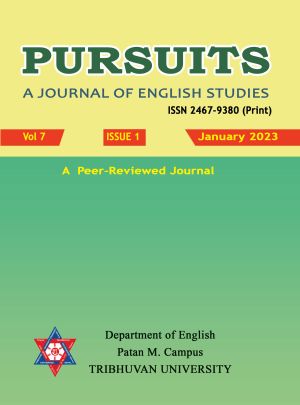The Interplay of Class Struggle and Human Relationships in G. G Marquez’s Love in the Time of Cholera
DOI:
https://doi.org/10.3126/pursuits.v7i1.55378Keywords:
Social injustice, class divide, patriarchy, capitalistAbstract
Gabriel Garcia Marquez in his Love in the Time of Cholera explores complex themes of social injustice, class struggle, and alienation in a Spanish colonial town located along the Caribbean coast of Colombia. He uses a masterful blend of magical realism, vivid imagery, and insightful prose to offer a poignant portrayal of the societal inequalities that plague the town and its inhabitants. At the centre of the novel's narrative are the two young lovers, Florentino and Fermina, who are separated by their social classes. Fermina's father expects her to marry Urbino, a man who can elevate their family's social status.
Marquez illustrates how Florentino, despite his deep love for Fermina, is confined by his lower social class and thus must work tirelessly to amass wealth with the help of his uncle. This struggle for social mobility is a powerful commentary on the constraints that exist within the town's social hierarchy. Throughout the novel, Marquez aptly captures the complex interplay between social classes and the effects they have on individuals. He shows how societal expectations and constraints can tear individuals apart and how class consciousness can have a devastating impact on human relationships. The power dynamics in the society are portrayed with great sensitivity, and the author offers a stark reminder of the injustices that exist in the society.
The novel is also rich in symbolism, which adds another layer of meaning to the narrative. The image of cholera, which permeates the novel, serves as a metaphor for the moral decay and sickness that exist within the town's social hierarchy. The character of Fermina also serves as an embodiment of the struggle against social conventions and the desire for personal freedom. The text offers a profound commentary on the human condition. Marquez's insightful understanding of social inequality and the effects of class consciousness on individuals is masterfully portrayed in the novel.




